It’s been almost six months since the Richmond Bread Riot, but scarcity and inflation are still making life difficult in Richmond. Here a group of butchers are willing to comply with a government request that they regulate their beef prices as long as 1) the government does not impress cattle that are being transported to the Richmond market 2) that they can pay their suppliers a price above the government price to make sure the suppliers still bring it to them 3) that the government get other business people to lower their prices a similar amount – otherwise the butchers’ expenses will stay at a high price.
From the Richmond Daily Dispatch September 28, 1863:
Regulating the prices.–Commendable move on the part of the Butcheries.
–We mentioned some days since that a move was on foot in this city to bring down the prices, and fix some standard governing the sale of all articles of provisions. Since that time we have ascertained that such is the fact, and, as a preliminary step, a meeting of all the butchers took place one day last week in compliance with a request from Major Wm. H. Smith, to arrange some plan for the purchase of cattle. At that meeting a committee was appointed to consider the matter, which committee met on Fridayevening last and drew up the following propositions. which have been submitted to the Government authorities:
“Major W. H. Smith–Sir: We, the undersigned butchers, having met together at your request to fix a standard price for purchasing cattle to be slaughtered for the inhabitants of this city, so as not to conflict with purchasers for the Government, and also to reduce the price of beef from our stalls, respectfully submit the following propositions;
“1. That all cattle on route to this market for sale on arrival shall not be impressed or interfered with by the Government.
“2. That it is quite inconvenient at times for us to leave our stalls to lay in our supplies, or to get suitable agents to do the same satisfactorily, and that the owners of stock may be permitted to bring it here, by allowing a price above the Government price sufficient to cover all risk — driftage and expense.
“3. That our profit will be principally regulated by the value of the fifth quarter, and the quality of the cattle must regulate the price thereof; we, therefore, request that we may pay in this market from 20 to 35 cents gross for fair to extra cattle, and that we retail the same from our stalls from 50 to 75 cents net by retail, which will be a reduction of about one-half from present rates.
“4. From the above propositions it will be seen that the farmer and butcher have reduced the present prices one half, while their expenses in all articles necessary and indispensable are still at inflated prices, with an upward tendency; and if everything useful for the support of the needy were likewise reduced 50 per cent, the evil which is sought to be remedied would in a great measure be averted.
“5. We earnestly hope, should the above liberal propositions be accepted, that you use all proper means to have all other necessaries of life reduced in a like ratio. Should the above result be not enforced, the above obligations to be null and void after 1st of November.next.
“6. The above resolutions to be put in force from and after the 10th of October. next.”
Richmond, Sept. 25, 1863.
It is also reported that robberies appear to be increasing. From the same issue
Robbery of a Church.
–Robberies in this city are becoming very frequent, and the operators seem to be indifferent as to where they make their raids. On Friday night last the Monumental Church was forcibly entered and robbed of one superior black silk gown, nearly new; one black silk scarf, belonging to the surplice; two table cloths, six damask napkins, two small napkins, and four damask towels
Richmond’s Monumental Church was constructed in 1814 as “a memorial to the 72 individuals that died in the Richmond Theater Fire of 1811.” Robert Mills, the architect, “was the only architectural pupil of Thomas Jefferson”.

